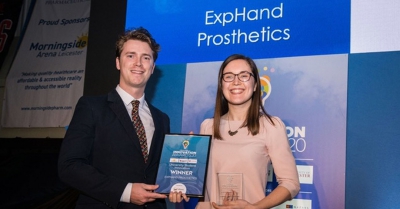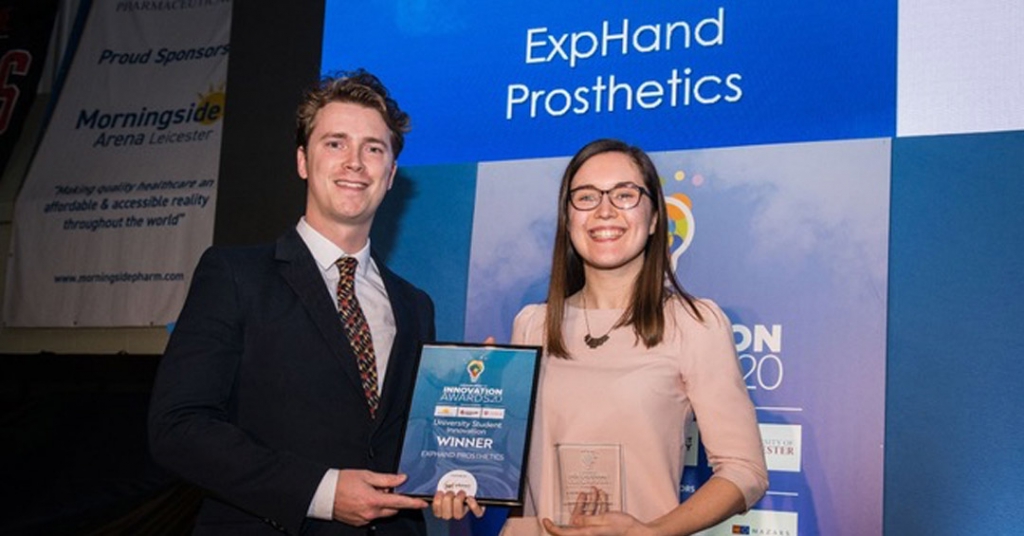
Transport
Apr 25 2024
Birmingham Airport (BHX) has achieved Level 3 (optimisation) of the Airport Carbon Accreditation (ACA) scheme for a second year.
Read more
A Loughborough University graduate start-up is transforming the manufacture and distribution of prosthetic limbs, making them more accessible to the millions of people who need them. Kate Walker’s venture ExpHand Prosthetics was launched as part of her postgraduate dissertation, using a 3D printed prosthetic arm which can adjust to fit children aged three to ten years old.
Loughborough University graduate Kate Walker developed and launched her social enterprise, ExpHand Prosthetics, in 2018 as part of her postgraduate dissertation, having nurtured the idea as an undergraduate. The inspiration for the venture was meeting toddler Zoey who was born with below-elbow limb loss. When Kate met her, she had never been offered a prosthetic.
About 30 million people live with limb loss and many need prosthetics but, for a variety of reasons – including expense, healthcare shortages and a lack of manufacturing expertise – can’t access them. Most prosthetics are custom-made and individually fitted by a prosthetist, generally making them unsuitable for later use by someone else. People often wait several months for them to be ready, and the devices need to be checked and serviced regularly.
All of this makes prosthetics expensive and waiting lists are long. The problem of access is worse for children – who quickly outgrow their prosthetics – and for people in developing countries where there are few trained prosthetists and little or no manufacturing expertise.

A novel way forward
Having studied Product Design Engineering, Kate realised that 3D printing offers a realistic solution to the related problems of access, expense, delay, device longevity and sustainability. Her invention, ExpHand, is a 3D printed prosthetic arm that can be adjusted to fit any child, aged three to 10 years old. Its design is modular and uses a universal socket, making it easy to fit and adjust as a child grows, without the need to visit a specialist. This also means it can be passed on to someone else once the original user outgrows it, and its components can be recycled when it reaches the end of its useful life.
The manufacturing process is relatively quick and cost-effective, with little waste, and provides opportunities for customisation in style and colour, making the devices more appealing to young people. Each unit costs less than £50 to produce and can be created close to where the user needs it, reducing delivery costs and time. Although intended for use in the developing world ExpHand is, of course, also suitable for children in the developed world.
A patent application for ExpHand has been submitted. Following further testing and user trials this spring, initial UK sales are scheduled to start in the summer with the worldwide market opening up soon after. Kate is also exploring how to expand the ExpHand product range to accommodate other types of limb loss.
Start-up support and recognition
In 2019, Kate was among the winners of Loughborough University’s Business Plan Competition and Enterprise Awards. She was also named Ingenuity19’s Experian Entrepreneur of the Year and was selected to take part in the EIT Healthcare Entrepreneurship Summer School, BioCity Business Accelerator Programme, and Engineers in Business Competition.
Kate is now based in The Studio, the University’s graduate start-up programme, housed in the Incubator on its Science and Enterprise Park (LUSEP).

Transport
Apr 25 2024
Birmingham Airport (BHX) has achieved Level 3 (optimisation) of the Airport Carbon Accreditation (ACA) scheme for a second year.
Read more
Global
Apr 24 2024
World-leading materials science and technology consultancy Lucideon is targeting international growth with expansion in the Japanese market.
Read more
Global
Apr 18 2024
The Midlands Engine Partnership will host a Pavilion for the very first time at this year’s UK Real Estate Infrastructure Investment Forum [21-23 May], providing regional partners with a platform to showcase their investment propositions, worth in excess of £42bn, to a global audience.
Read more